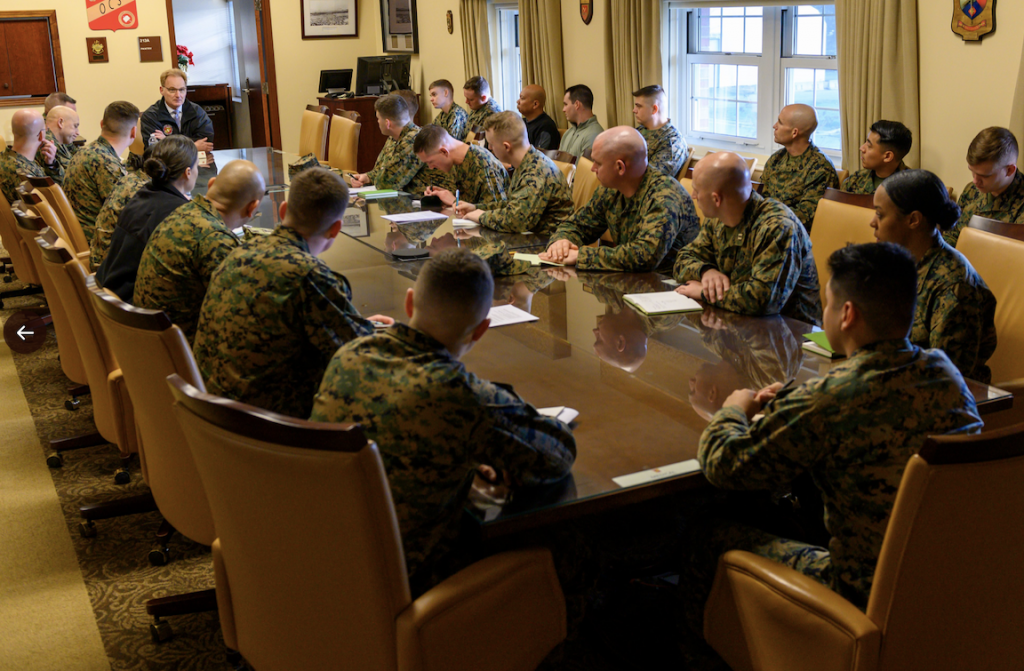By Anonymous
I had the privilege of being taught by some amazing people throughout my upbringing into the Marine Corps. The common theme they brought up was humility.
As a boot officer I had no experience of my own. What I did have were the stories of those who have been in for longer, from Lance Corporals to Generals, who took the time to teach me things. I had books I’d read, whether they were doctrine or memoirs, podcasts, some well-intentioned leadership panels and lectures, and the five common senses. I’m embarrassed to say I hardly used the latter until quite recently.
Through good fortune I was given the privilege of platoon command after MOS school and I promised myself not to be an arrogant or self-serving cliché of a leader. I listened to my platoon sergeant. I got to know my squad leaders. I remembered the interests of my lance corporals and made it a point to not make every interaction with them a teachable moment on ethics, but to just be human and connect with them. The platoon largely ran itself, I believed I was applying what I had learned.
My interactions with my company staff was not as fruitful. In an attempt to ensure I didn’t come across as an egotistical fool I tried to show how “humble” I was, which many times amounted to a self-deprecating sense of humor and an inability to come up with creative solutions to problems.
“What do I know? I’m just a Lieutenant.” became the company LPA’s motto.
I convinced myself there was nothing useful I could provide to my higher ups until I’d been in long enough to have relevant experience. I read doctrine and talked with senior leaders, I devoted myself to developing my platoon, but I provided nothing original to the fight. My feet were never held to the fire and I missed an opportunity to grow.
My next unit was an excellent second chance to do better… and I blew it.
I was acutely aware of the fact I was the most junior officer in any room, and interpreted that to always mean I brought nothing valuable to the table. I told myself if I had thought it, surely those with more on their collars had already considered it.
A more helpful perspective was brought to my attention by a mentor, and I did not give it the credit it deserved: by being so junior I would be least indoctrinated in the pervasive groupthink, I would be a set of fresh eyes able to remind people that there is another reality outside of their power points and green/ red trackers.
I saw many issues; sections were understaffed, improperly managed, and leadership’s priorities were all out of whack. I silently sat through many a meeting without speaking up because “I’m just a Lieutenant”.
I continued to fall back on sarcastic comments and commiserated with my enlisted. We suggested solutions to many of the battalion’s problems in my office over Reigns and Monsters. Those that made their way to company staff were almost always shot down by those with “more experience” who could not part from the wet monkey theory that is killing the Corps. Common sense and fresh eyes are often more useful than dogma and protocol when facing a recurring problem.
I fought half-hearted battles over personnel issues, training plans, and staffing with my company leadership, believing I would lose before the argument even began. They refused to see that the methods they were using were not delivering the results they wanted, and I failed to communicate that to them effectively. I had learned to be helpless.
Listening to “the guy on the ground” does not end when they stop talking. It ends when the people who can enact the changes they need have heard them. It was my job to communicate those things, to make an honest effort to provide fresh solutions, and to behave with the same professional aggression in meetings as I did in the field. I’d confused humility and professionalism with a lazy submissiveness that pervades so many garrison environments.
I began to understand this and change my behavior when I found myself in a new unit with a unique staff breakdown and field grade officers from other service branches asking for my input and then actually using it. Suddenly it didn’t seem pointless to speak to reality as I saw it.
When I prepare for and participate in meetings, I now do so with focused attention toward what my five senses are telling me, and how that information relates to everyone else in the room.
Common sense, effort, and effective communication know no rank or experience level. They are not tied to humility or arrogance; they are a common currency that all organizations deal in.
The author is a Junior Officer in the USMC.

